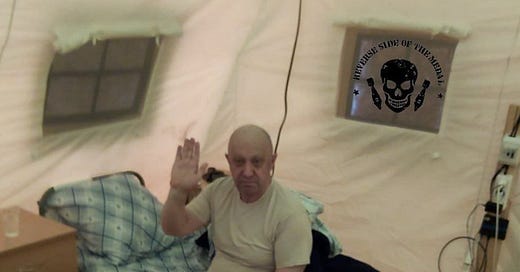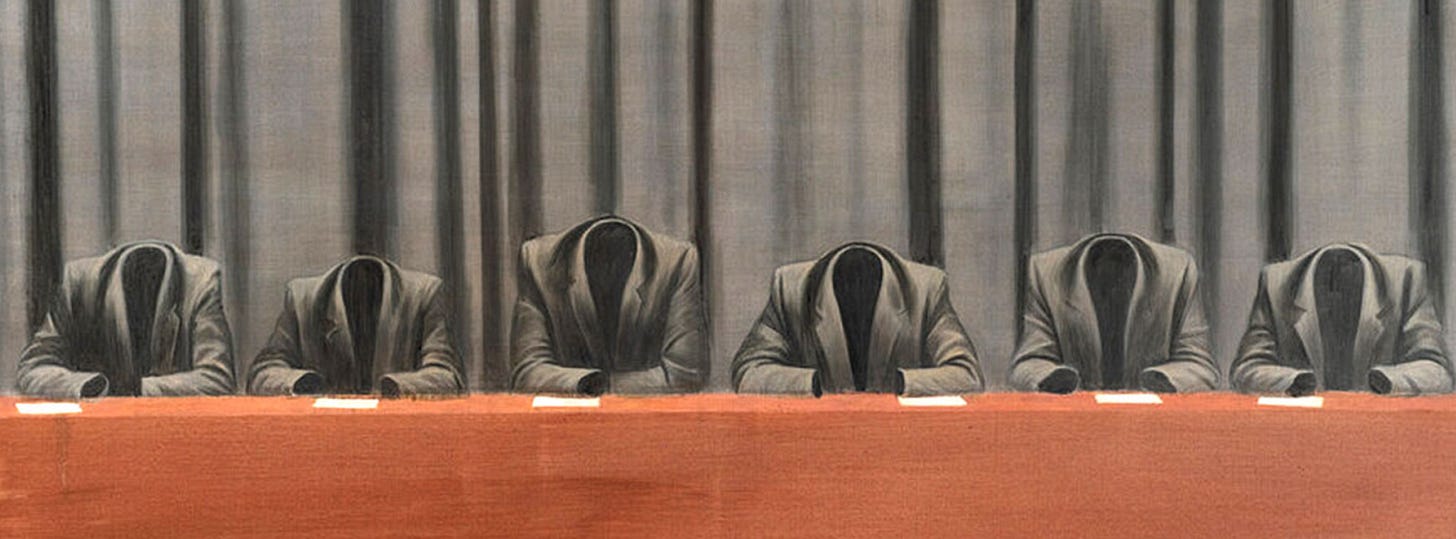The Prigozhin affair in June provides a glimpse into the workings of the criminal organization that calls itself the Russian Federation and what the end game for this war must be. Last month, Yevgeny Prigozhin, oligarch, a friend of Putin’s, and chief of the Wagner mercenary army, lost his internal struggle with rival military generals and on June 23 decided to march troops from Ukraine to Moscow. His shocking tantrum lasted a day, but 13 Russian soldiers died, frightened Russians withdrew savings from banks, the ruble collapsed, and Putin called the rebels “traitors”. Prigozhin stopped his “protest” after cutting a deal which allowed him to keep his weapons and funds if he moved to Belarus. Putin’s perplexing climb-down was in stark contrast to the request by Russian prosecutors days later that 20 years be added to the sentence being served by Alexei Navalny, another critic and protester, who commented: "Those who were declared `traitors’ to their Motherland … as Russia watched in astonishment … by lunch agreed on something with someone and went home.”
What is the significance of the Prigozhin affair? Some say it shows Putin’s weakness because he didn’t jail Prigozhin. CIA director Bill Burns said Putin will get even eventually and the facts are that Putin has used the incident to fire or demote more than a dozen lesser generals. But Putin’s kid-glove treatment of Prigozhin perplexes because Western strategists embrace the misconception that Russia is a nation-state like others. It is not. The Russian Federation is the most successful kleptocracy in history, headed by Putin on behalf of Russian oligarchs who mostly live outside Russia, along with their wealth. They, and their well-paid technocrats, hold an iron grip on the country and are thoroughly unconcerned about the wellbeing of fighting forces or the populace.
But Prigozhin was the exception, a long-standing pal of Putin’s who became immersed in the war, donned a uniform, and hung around with his Wagner troops. He criticized the military brass for months, called out the war as unnecessary, and railed against the enormous casualties. Eventually his anger boiled over into a mutinous stunt which was humiliating to Putin. But there was no Stalinist “Night of the Long Knives” assassinations for collaborators or “window tax” for Prigozhin. Instead, the aftermath was business-as-usual: A meeting was held days later, a deal was cut, Putin staged photo ops to bolster his image and stop the run on banks, and has since doubled down on his warmongering. Last week, he began bombing Ukrainian grain ports and storage facilities, and banned shipments through the Black Sea to weaponize global food prices.
Putin’s handling of the “Prigozhin Problem” illustrates that his war is not about strategy, troop losses, or Ukrainians. It is not a cause, existential crisis, or moral stance. It is about money. Ukraine was invaded in 2022 because it was about to get out from under 30 years’ of captivity after electing Volodymyr Zelensky to fight corruption and join the European Union. By February 24, 2022, Putin lost patience and invaded to assassinate Zelensky and reclaim Ukraine so that Russia’s oligarchy and its Ukrainian allies could continue to plunder its agricultural, energy, and mineral resource wealth. But he miscalculated Ukrainians, the West, and the agility of energy producers who have been able to replace Russian oil and gas in Europe.
Seen through this filter, neither peace talks nor negotiations are possible because Russia is a criminal organization and not a legitimate nation-state capable of good faith negotiations. Moscow has not adhered to an international commitment for 30 years. Its state capture by a bunch of wealthy guys, posing as businessmen or political leaders, is complete and solid. The country, and its 142 million people, are controlled by fear, disinformation, censorship, military force, human rights abuses, cultural genocide, and poverty. So exactly with whom can the West negotiate?
Worse, Russia’s current regime is without opposition and virtually offshore. This means that further tightening of the screws on Mother Russia’s economy only hurts ordinary Russians because the oligarchy’s assets are socked away elsewhere. A report by the National Bureau of Economic Research in 2017 – before the invasion -- estimated that 60 percent of the country’s wealth was offshore in tax havens, assets, or buried in anonymous companies. Since the invasion, it’s a safe bet that virtually all of it has left. This means that Putin and his gang have no skin in the game.
Russia’s oligarchs, with multiple passports and assets all over the world, aren’t interested in a deal to stop the war in order to save lives or improve living standards and future prospects. Their governance goals are not principled, but pecuniary. Their wealth is not at risk which also makes leverage or negotiations impossible, and renders diplomacy irrelevant. Putin’s kleptocracy has nothing to lose by continuing the war and nothing to gain by stopping it either.
Fortunately the Prigozhin affair has pulled back the curtain on the fact that Putin cannot militarily win the war. His rants exposed its military incompetence, corruption, and mass casualties. The only effective fighting force on the Russian side was his Wagner Group, now destroyed and exiled in Belarus. And even Wagner has been decimated, according to a recent leak on Russia’s Telegram channel. The Wagner source claimed 22,000 were killed in Ukraine, 40,000 wounded, and only 25,000 remain.
This means Russia cannot win on the battlefield -- but won’t negotiate either. In such a scenario the only rational end game is total military defeat and expulsion from Ukraine. Ukrainians have clawed back 50 percent of the territory Russia seized after 2022, but need long-range missiles and F-16s from the United States and others to finish the job. Hopes are that by the end of the year, Ukraine will have a fully operational air force of F-16s plus long-distance missiles to secure victory.
The Prigozhin dust-up has also exposed another dirty secret. Putin wimped out in the face of an outright challenge which is why the West should continue to ignore his “red lines” and threats of nuclear use. If Prigozhin taught us nothing else, it is that the West is dealing with a cabal of greedy white collar criminals and technocrats, not an ideologically crazed cult committed to launching a nuclear holocaust on behalf of some insane beliefs or on the whim of a leader. They don’t die in trenches, they fly on private jets out of the country.
Putin pins his hopes on a military quagmire in Ukraine that will weary the West and pave the way for anti-war leaders to be elected in the America and Europe in 2024. That is why the West must go “all in” militarily as well as declare war against the Russian Oligarchy globally. Moscow must be booted from the United Nations and World Trade Organization, declared a sponsor of state terrorism, all its companies delisted from stock exchanges, its citizens denied visas or extradition protection, and all Russian assets must be seized abroad. These represent real deterrents that will force Russia’s leaders to the table, but only after they have withdrawn from Ukraine altogether.
Then the so-called Russian Federation will implode peacefully as did the Soviet Union after its excesses at home and military failure abroad in Afghanistan. New leaders and regional movements will emerge and allies will midwife these mini-states into countries so they can form alliances or join existing, compatible nation-states.
The Prigozhin Parable is that this is a war waged by obscenely rich guys who watch it from afar on big screens in mansions and on yachts. This is not about justice, honor, or existential threat, but about greed. And only draconian actions aimed at destroying this rotten elite, as well as its military, will terminate this criminal organization. The war, and much global strife, will only end once Russia is dismantled and its oligarchy bankrupted.






The issue is that few journalists have a background in business and white collar criminality (plus geopolitics, politics and technology) like I have. Ukraine and Russia are being written about by historians, political types, policy types, and not people who have been involved in the "real world" of money, greed, and white collar fraud.
Brilliant commentary
I do hope that the White House has a paid up subscription to your essays